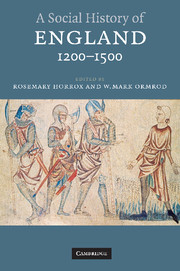Book contents
- Frontmatter
- Contents
- List of illustrations
- Preface
- List of contributors
- List of abbreviations
- 1 Introduction: Social structure and economic change in late medieval England
- 2 An age of deference
- 3 The enterprise of war
- 4 Order and law
- 5 Social mobility
- 6 Town life
- 7 The land
- 8 A consumer economy
- 9 Moving around
- 10 Work and leisure
- 11 Religious belief
- 12 A magic universe
- 13 Renunciation
- 14 Ritual constructions of society
- 15 Identities
- 16 Life and death: the ages of man
- 17 The wider world
- 18 Writing and reading
- 19 Conclusion
- Further reading
- Index
5 - Social mobility
Published online by Cambridge University Press: 05 June 2012
- Frontmatter
- Contents
- List of illustrations
- Preface
- List of contributors
- List of abbreviations
- 1 Introduction: Social structure and economic change in late medieval England
- 2 An age of deference
- 3 The enterprise of war
- 4 Order and law
- 5 Social mobility
- 6 Town life
- 7 The land
- 8 A consumer economy
- 9 Moving around
- 10 Work and leisure
- 11 Religious belief
- 12 A magic universe
- 13 Renunciation
- 14 Ritual constructions of society
- 15 Identities
- 16 Life and death: the ages of man
- 17 The wider world
- 18 Writing and reading
- 19 Conclusion
- Further reading
- Index
Summary
In 1970 F. R. H. Du Boulay famously dubbed the later middle ages an ‘age of ambition’. But did upward social mobility typify late medieval English society, and should we take social mobility to be the process by which whole classes of people benefited or lost from late medieval economic conditions, or as a matter of the success or failure of an individual? The possibility of a whole social group experiencing a shift in fortune is best represented by the case of the peasantry. It is now fairly certain that the living standards of whole classes of peasants declined towards the starvation line in the economic conditions prevailing before the Black Death, and that they rose significantly in the era of comparative shortage of labour and abundant availability of land between 1350 and 1500. But changes in the fortunes of a social group were often more complex than this. In the case of the gentry, high inflation and stiff economic competition in the thirteenth century may have led to the decline of some knightly families relative to the fortunes of noblemen and of lesser freeholders. Yet, as Peter Coss has discussed above, the composition of ‘the gentry’ was subject to change as the social ranks deemed to qualify for ‘gentility’ came to include first esquires and then gentlemen. In shire administration, the later middle ages saw some of these lesser gentry take over positions which had been held almost entirely by knightly families in the thirteenth and early fourteenth centuries.
- Type
- Chapter
- Information
- A Social History of England, 1200–1500 , pp. 113 - 133Publisher: Cambridge University PressPrint publication year: 2006
- 3
- Cited by

